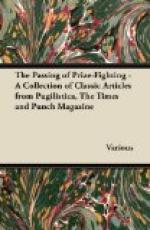Mr. WARDLE is the latest example of the poacher turned gamekeeper. A few months ago, as leader of the Labour Party, he was instant in criticism of the ineptitutes of Government officials. This afternoon, upon his old friend, Mr. TYSON WILSON, venturing to refer to the “stupid decisions” of the Board of Trade, Mr. WARDLE was down on him in a moment. With the air of one who had been born and brought up in Whitehall Gardens, he replied, “Stupid decisions are not made by the Board of Trade.”
The Pacifists had rather a mixed day.
* * * * *
[Illustration: PENSIONS.
MR. HODGE.]
* * * * *
They were visibly relieved when Mr. BONAR LAW (supported by Mr. ASQUITH) declined to admit into the Bill for extending the life of this Parliament a provision enabling constituencies to get rid of Members who had ceased to represent them. But they did not like his contemptuous reference to their argumentative powers. Mr. TREVELYAN, who regards himself as the representative (by literary descent) of CHARLES JAMES FOX, was particularly annoyed.
* * * * *
[Illustration: IN RE ADMIRAL JELLICOE.
MR. LYNCH. DR. MACNAMARA.]
* * * * *
As party-funds are rather under a cloud just now the Government thought they might justify their existence by drawing on them for the campaign against enemy propaganda. But their custodians thought otherwise. The Tory Whip was prepared to make a small contribution; the Liberal would give nothing, on the ground that the total required was extravagantly large. So the country will have to foot the bill.
Wednesday, November 14th.—The knowledge that Mr. ASQUITH was to “interpellate” the PRIME MINISTER regarding his recent speech in Paris, and the Allied War Council therein described, brought a crowd of Members to the House, and filled the Peers’ Gallery with ex-Ministers scenting a first-class crisis.
The protagonists on entering the arena were loudly cheered by their respective adherents, but the expected duel did not come off. Mr. ASQUITH’S questions were searching enough, but not provocative. Mr. LLOYD GEORGE’S reply was comprehensive and conciliatory, and ended with the promise of a day for discussion. Instead of a fight there was only an armistice, usually a preliminary to a definite peace.
A little disappointed, perhaps, the Peers betook themselves to their own Chamber, there to hear Lord PARMOOR discourse upon the woes of conscientious objectors. Many of them, he thought, had been vindictively punished for their peculiar opinions. Nobody, in a somewhat cloudy discussion, made it quite clear whether the Tribunals or the Army authorities or the Home Office were most at fault; and Lord CURZON’S suggestion that persons who refused not merely to fight but to render any kind of service to their country in its time of need were not wholly free from blame had almost the air of novelty.




